
The Temptations are an American vocal group from Detroit, Michigan, who released a series of successful singles and albums with Motown Records during the 1960s to early 1970s. The group's work with producer Norman Whitfield, beginning with the Top 10 hit single "Cloud Nine" in October 1968, pioneered psychedelic soul, and was significant in the evolution of R&B and soul music. The band members are known for their choreography, distinct harmonies, and dress style. Having sold tens of millions of albums, the Temptations are among the most successful groups in popular music.
Bossa nova is a style of music.
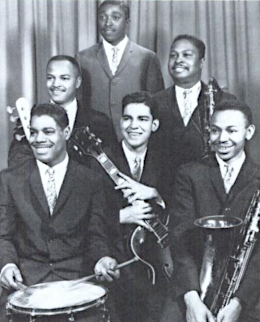
The Funk Brothers were a group of Detroit-based session musicians who performed the backing to most Motown recordings from 1959 until the company moved to Los Angeles in 1972.

Eddie Harris was an American jazz musician, best known for playing tenor saxophone and for introducing the electrically amplified saxophone. He was also fluent on the electric piano and organ. His best-known compositions are "Freedom Jazz Dance", popularized by Miles Davis in 1966, and "Listen Here".

"Here Comes the Judge" is a song by American soul and comedy singer Pigmeat Markham, first released as a single in 1968 on the Chess label. The record entered the UK Singles Chart in July 1968, spending eight weeks on the chart and reaching number 19 as its highest position. The song originated with his signature comedy routine "heyeah (here) come da judge", which featured Markham as a courtroom judge dealing with various legal cases and made a mockery of formal courtroom etiquette. Due to its rhythmic use of boastful rhyming dialogue over a funky drum beat, it is considered a precursor to hip hop music.

The Monkees Present is The Monkees' eighth album. It is the second Monkees album released after the departure of Peter Tork and the last to feature Michael Nesmith until 1996's Justus.
Frederick Earl "Shorty" Long was an American soul singer, songwriter, musician, and record producer for Motown's Soul Records imprint. He was inducted into the Alabama Jazz Hall of Fame in 1980.

"Superstar (Remember How You Got Where You Are)" is a 1971 hit single for the Gordy (Motown) label, recorded by The Temptations and produced by Norman Whitfield. Something of an early ancestor to the "diss songs" prevalent in hip hop music towards the end of the 20th century, "Superstar" is an attack at two former Temptations members, David Ruffin (who had been fired back in 1968) and Eddie Kendricks (who quit the act in early 1971 and negotiated a Motown solo deal). The song appears on the 1972 album Solid Rock.
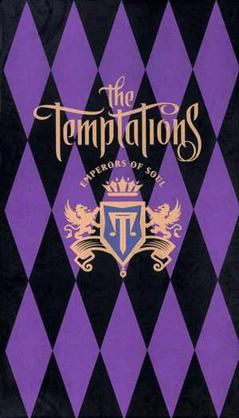
Emperors of Soul is a 1994 box set compilation for The Temptations, released by Motown Records. The five-disc collection covers the Temptations' entire four-decade history, from the first recording of The Distants in 1959 to four new recordings by the then-current Temptations lineup of Ali-Ollie Woodson, Theo Peoples, Ron Tyson, and stalwart members Otis Williams and Melvin Franklin.
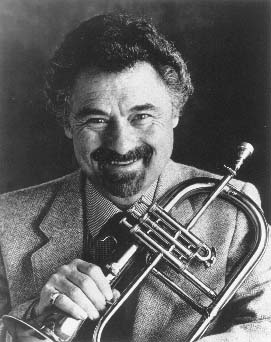
Milton "Shorty" Rogers was an American jazz musician, one of the principal creators of West Coast jazz. He played trumpet and flugelhorn and was in demand for his skills as an arranger.

Martin Louis Paich was an American pianist, composer, arranger, record producer, music director, and conductor. As a musician and arranger he worked with jazz musicians Peggy Lee, Ella Fitzgerald, Stan Kenton, Art Pepper, Buddy Rich, Ray Brown, Shorty Rogers, Pete Rugolo, Ray Charles and Mel Tormé. His long association with Tormé included one of the singer's earliest albums, Mel Tormé with the Marty Paich Dek-Tette. Over the next three decades he worked with pop singers such as Andy Williams and Jack Jones and for film and television. He is the father of David Paich, a founding member of the rock band Toto.
"Together Again" is a 1964 song by American country singer and guitarist Buck Owens.

"Cut Across Shorty" is a song written by Marijohn Wilkin and Wayne P. Walker, originally released and made popular by Eddie Cochran. It was the b-side of his number 1 UK hit "Three Steps To Heaven" and the last song he ever recorded.

Identify Yourself is a 1979 album by American R&B group The O'Jays, released on the Philadelphia International Records label. It was recorded at Sigma Sound Studios in Philadelphia, with four tracks produced by Kenny Gamble and Leon Huff, three by group members Eddie Levert and Walter Williams and one by the esteemed Philadelphia producer and composer Thom Bell.
"Come on down!" is a catchphrase from the television game show The Price Is Right.
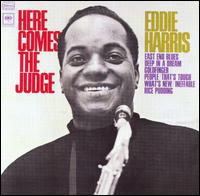
Here Comes the Judge is an album by American jazz saxophonist Eddie Harris recorded in 1964 and released on the Columbia label.

"Here Comes the Judge" is a 1968 song written by Shorty Long, Billie Jean Brown and Suzanne de Passe, and performed by Long. The song was Long's biggest hit, reaching No. 4 on the U.S. R&B chart and No. 8 on the Billboard Hot 100. It held the No. 10 spot on Cashbox for two weeks. The song stayed on the Hot 100 for 11 weeks and Cashbox for 9 weeks. The song also entered the UK chart in July 1968, and was a Top 30 hit, peaking at #30.
Plug Me In is a 2007 box set by rock band AC/DC.
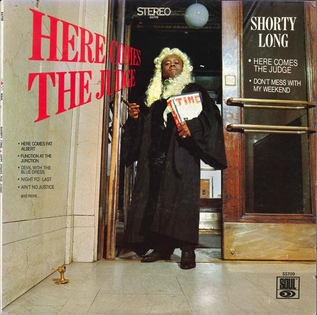
Here Comes the Judge is the 1968 debut studio album by American rhythm and blues singer Shorty Long, released on Motown subsidiaries Soul Records and Tamla Motown. After recording several singles for Motown, Long had an unexpected hit with the title track to this release and the label rushed out a full album, compiling several songs already released as singles as well as new recordings. That year, Long toured with a stable of Motown acts including The Contours, The Marvelettes, and The Spinners to promote the album, which was the only one released in Long's lifetime.













